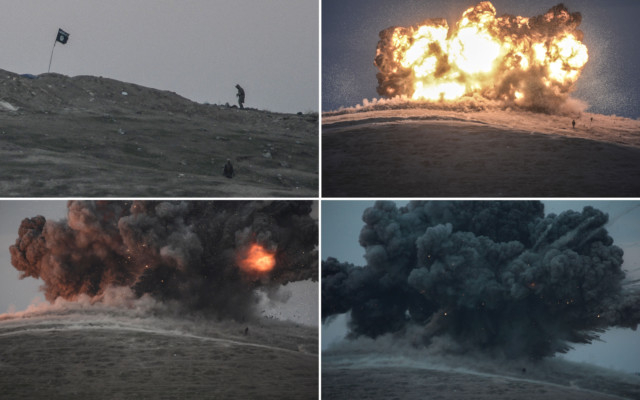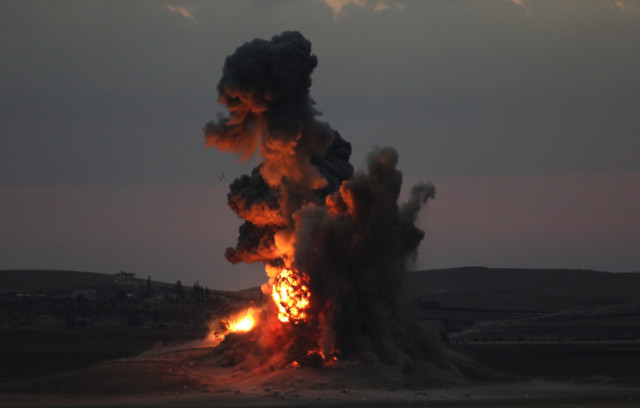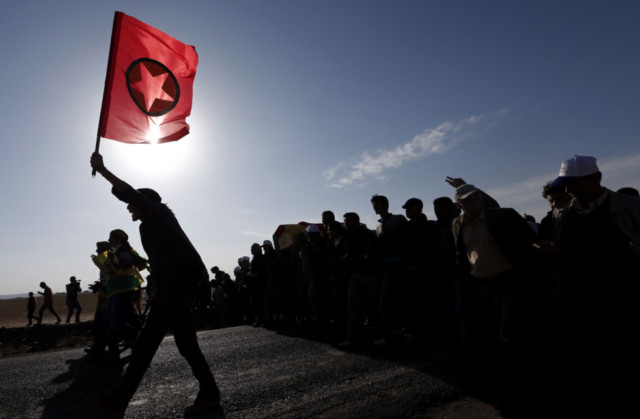
Mursitpinar, Turkey: Hundreds of Syrian rebels are to reinforce Kurdish fighters defending the border town of Kobani, neighbouring Turkey said on Friday, as Washington voiced confidence its fall to Islamist militants could be averted.
US-led air strikes have helped the town’s Kurdish defenders hold back Daesh group militants but commanders have complained that, after more than five weeks of heavy fighting, their forces are exhausted and in need of help.
The Iraqi Kurdish authorities have agreed to send well-trained Peshmerga fighters after Ankara said it would allow 200 of them to travel through its territory to Kobani, also known as Ain Al Arab.
Turkish President Recep Tayyip Erdogan said on Friday that they would be joined by 1,300 fighters of the mainly Arab rebel Free Syrian Army (FSA).
The Syrian Kurds have “accepted 1,300 people from the Free Syrian Army and they are holding talks to determine the transit route,” Erdogan told reporters.
There was no immediate confirmation from the Syrian Kurds.
Ankara has tightly controlled the flow of fighters and weapons to Kobani’s defenders because of their links to the outlawed rebel Kurdistan Workers Party (PKK), which has fought a bloody three-decade insurgency in southeastern Turkey.
But it has come under heavy US pressure to do more for the town’s defence.
Erdogan said that the FSA, which Turkey has backed in its more than three-year civil war with the Damascus regime, was his preferred option for reinforcing Kobani in talks with US President Barack Obama.
“As you know, in our talks with Obama we had agreed that the FSA could be the first choice and the second choice could be Peshmerga,” he said.
There are already some Arab rebel fighters battling the militants west of Kobani in alliance with the Kurdish forces.
Late Thursday, prominent rebel figure Colonel Abdul Jabbar Al Okaidi told Al Jazeera television that the main rebel factions in northern Syria had agreed to send reinforcements to Kobani.
Kurdish forces retook a strategic hill overlooking the town on Friday after coalition air strikes put the militants to flight the previous evening.
Around 20 Kurdish fighters raised their yellow, red and green flag over Tall Shair hill, which Daesh fighters had taken earlier this week.
“I think the Kurdish defenders... are going to be able to hold,” an official at US Central Command said, speaking on condition of anonymity.
It was a sharp change in assessment from just Sunday when US officials spoke of a “crisis” situation as Washington made its first arms drops to the town’s defenders.
New gains
US-led aircraft have flown nearly 6,600 sorties in the air war against Daesh in Iraq and Syria, and dropped more than 1,700 bombs, the US military said.
The air strikes have helped avert Kobani’s fall but have not stopped Daesh making new gains in parts of Iraq, where a US official acknowledged that it could be months before government forces were ready to mount a major fight back.
The militants have captured more ground west of Baghdad in recent days, further reducing the government’s shaky hold on Sunni-dominated Anbar province.
When Daesh fighters swept through the Sunni Arab heartland north and west of Baghdad in June, government security forces largely melted away and a US military official said it would take months for the Shiite-led government in Baghdad to reorganise them for a counteroffensive.
Iraqi security forces are currently able to stage small-scale attacks against Daesh, but need time to plan and train for a larger operation, even with the aid of US-led air strikes, the US official told reporters.
“It’s well within their capability to do that [counter-attack], on the order of months, not years,” the official said.
But he added: “It’s not imminent.”













